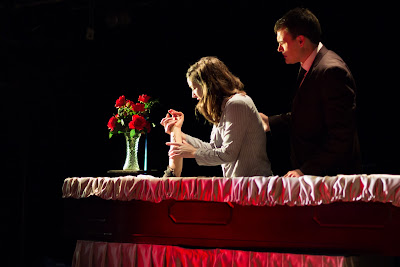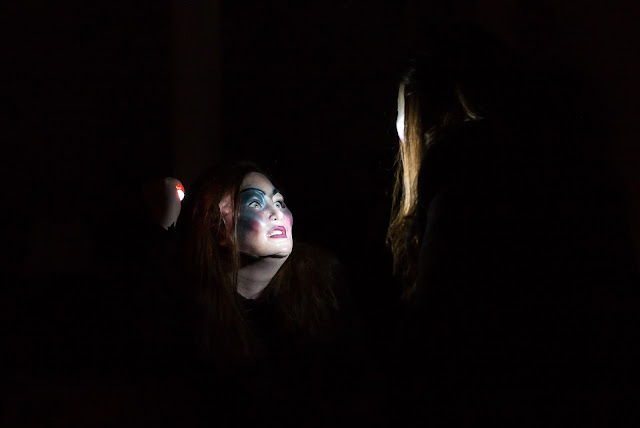 |
| Rick Zwart, Alice Privett - Lewis Murphy: Snow (act 1) - The Opera Story - photo Nick Rutter |
Reviewed by Robert Hugill on Feb 20 2017
Star rating:
Three contrasting young composers, one story; The Opera Story's impressive debut with a new opera
 |
| Lewis Murphy: Snow (act 1) - The Opera Story photo Nick Rutter |
The Opera Story was founded by Manuel Fajardo and Hamish Mackay, and for their first production they decided upon a new opera based around the story of Snow White, not the tradition Disney version but one refracted through different European folk tales. JL Williams' poetic libretto took three episodes, and each of these acts was given music by a different composer.
 |
| Alice Privett - Tom Floyd: Snow (act 3) - The Opera Story photo Nick Rutter |
Because three different folk-traditions had been used, the narrative in the three acts was to a certain extent discontinuous and director James Hurley used this creatively by keeping Alice Privett's Snow White on stage all the time, an older woman remembering. It was Privett who was key to the performance, being the only character who appeared in all three acts and whose coherent characterisation through three very different operas gave us a thread to lead us through the piece.
Folk-tales are elliptical things, the very quality which makes them tricky to use yet tempting in opera. The tangential nature of the story telling, using archetypes rather than real people, leaves plenty of space for the music. James Hurley's production seemed rather too content to tell the story simply but effectively, leaving any psychological insights to the music. Fairy tales are full of Freudian suggestion. Sometimes directors rather go too overboard in this direction, but in Snow I rather wanted more psychological suggestion.
 |
| Polly Leech, Rick Zwart - Tom Floyd: Snow (act 3) - photo Nick Rutter |
The second act, The Death of the Seven Dwarves, with music by Lucie Treacher had a far more intense and dramatic premise. Alone, wandering and desperate, Snow White comes across the house of the seven dwarves, though it is empty. She hides when two village women (Polly Leech and Alison Langer) break in having heard rumours about the dwarves and their treasure, and other sordid tales. They mark the door so the men of the village will know the location and when the dwarves return home they are slaughtered and the cottage set alight.
 |
| Alice Privett, Cliff Zammit Stevens - Tom Floyd: Snow (act 3) - photo Nick Rutter |
For the final act, The Crystal Casket, with music by Tom Floyd, Prince Raven (Rick Zwart) comes home from hunting dragging a crystal casket containing a dead woman (Snow White), he announces that this is is beloved. His mother, the queen (Polly Leech) is appalled and when the prince goes to war she hides the casket. When he returns, the servant (Cliff Zammit Stevens) goes to retrieve the casket and finds Snow White miraculously revived. The ending of the piece is ambiguous, and James Hurley's direction with the prince returning grievously wounded, gave the impression of the prince and Snow White united in death. The setting here was completely modern, and it had all the trappings of a funeral home, Raven and Sons, an interesting and practical idea, though I felt that something could have been made of the fact that Rick Zwart played both Prince Raven and Snow White's father.
I though that Floyd's music for this act was the most complete, he wrote in a rather dark dramatic idiom with some angular lines, yet created really intense vocal images. The queen was given a really meaty solo which Polly Leech sang superbly, and Rick Zwart was brilliant as the rather strange and disturbed prince. Cliff Zammit Stevens was woefully underused in the opera (he had a tiny part in act one), but he made the servant's short contributions really count.
 |
| Lucie Treacher: Snow (act 3) - The Opera Story - photo Nick Rutter |
This was an impressive first project for The Opera Story, bringing three very different short works to life. All three composers impressed in different ways, all three are young and their opera show an interesting grasp of operatic form and further essays from them are to be encouraged. The hard working cast coped admirably with three different styles, and gave performances which brought out the very best in the music.
Elsewhere on this blog:
- Romanticism and contrast: Parnassius Piano Duo in Parry, Copland and Rachmaninov - concert review
- Diverse and engaging: Alina Ibragimova and the Scottish Ensemble in Bach and Hartmann - concert review
- Discovering the music beneath: Janusz Wawrowski Sequenza - CD review
- I chat to Peter Dijkstra; conductor of the Netherlands Chamber Choir, about the choir's first UK appearance for 15 years - interview
- An immersive experience: Even You Song at Peterborough Cathedral - music theatre review
- The Food of Love: Settings of the Song of Songs from Ensemble Plus Ultra - concert review
- Farinelli - a Portrait: Ann Hallenberg, Christophe Rousset, Les Talens Lyriques - CD review
- A unique campus of the arts: A walk round Snape Maltings with Roger Wright - feature article
- Music among friends: Klangrede from Zafraan Ensemble & Titus Engel - CD review
- Queer Talk: Homosexuality in Britten's Britain at The Red House - Exhibition review
- Composition is a full on meeting with his Christianity:: I talk to composer Patrick Hawes about his new album Revelation - interview
- Taking them seriously: Gilbert and Sullivan's The Pirates of Penzance at English National Opera - opera review
- Energy and commmittment: Rebecca Miller and the Salomon Orchestra in Kodaly and Bartok - concert review
- Home





%20and%20Schyler%20Vargas%20(Norman)%20on%20the%20Yellowstone%20River,%20August%202025%20Photo%20by%20Charlotte%20Mae%20Ellison.jpg)





No comments:
Post a Comment